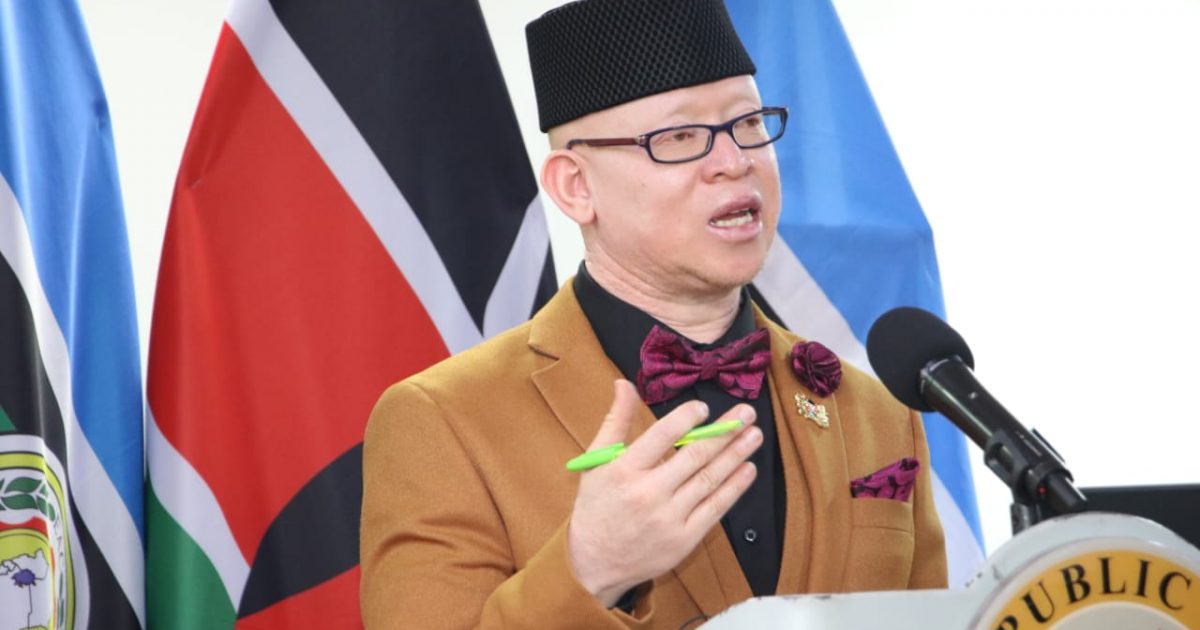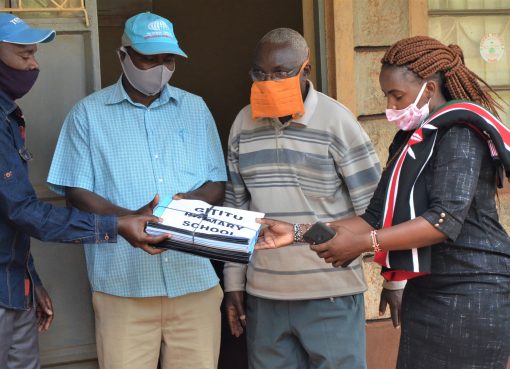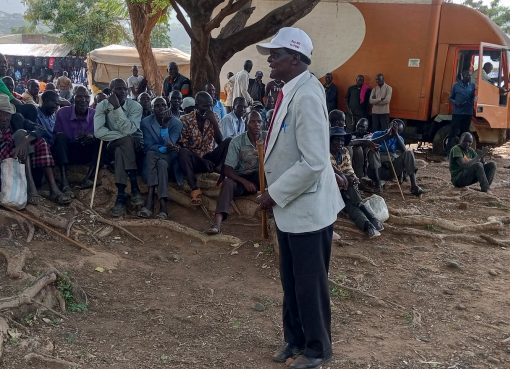Two years since the Kenya Kwanza government took office under the leadership of President William Ruto, the administration has been able to achieve key milestones it had targeted to accomplish as it embarked on a transformative mission to uplift Kenyans through the Bottom-Up Economic Transformation Agenda (BETA).
Government Spokesperson Isaac Mwaura said that the BETA agenda has been the cornerstone of the government’s vision, built on five key pillars: agriculture, the MSME economy, affordable housing, universal healthcare, the digital superhighway, and the creative economy.
“This strategic blueprint, envisioned under the Kenya Kwanza administration, has laid the foundation for an inclusive and prosperous Kenya. The government has achieved significant progress in each of these areas, which has positively transformed the lives of millions of Kenyans,” said Mwaura.
Speaking at the Kenyatta International Convention Centre (KICC) on Friday, Dr. Mwaura said that reforms in the agriculture sector focus on shifting from consumption subsidies to production subsidies, with a clear aim to boost agricultural productivity.
“The government’s key goals in the sector include reducing farm input costs, increasing farmers’ incomes, creating more jobs in the agricultural sector, and enhancing productivity through value addition,” said Mwaura.
To achieve these goals, he said that the government has implemented two key strategies: the Fertiliser Subsidy Programme, which lowers input costs and improves yields, and deployed initiatives to enhance agricultural productivity and value chains, focusing on adding value to products to improve market competitiveness and farmer profitability.
The Government Spokesperson said that the fertiliser subsidy Programme involved the digital registration of all farmers and the subsequent provision of low-cost fertiliser. Currently, the digital platform has registered 6.15 million farmers, facilitating the distribution of low-cost fertiliser and providing essential planning data.
“The number of fertiliser bags disbursed increased from 1.4 million in 2022 to 8.6 million in 2024, while the cost per bag dropped from Sh6, 000 to Sh2, 500. As a result, maize production rose by 38.9%, from 61.74 million to 85.7 million bags, reducing maize imports by 33.7%,” explained Mwaura.
He explained that the cost of a 2 kg packet of maize flour also fell by 23.3%, from Sh169.9 to Sh130.38, saying that the government’s agricultural reforms have significantly improved key agricultural value chains.
In the tea sector, Mwaura said that the removal of VAT on locally sourced tea and support for MSMEs boosted smallholder farmer earnings by 15.8%. In the edible oils sector, sunflower farming acreage increased by 8.3% through seed distribution. The leather industry saw a 30% rise in processing capacity utilisation, aided by initiatives such as operationalising the Kariokor Manufacturing Facility.
“The dairy sector experienced a 35% increase in milk prices, boosting production by 13%. Paddy rice and milled rice production rose by 19% and 14%, respectively. Cotton cultivation expanded by 332% due to seed and pesticide distribution. These interventions have enhanced productivity, reduced costs, and improved farmer incomes, contributing to broader socio-economic transformation,” he explained.
On the Micro, Small, and Medium Enterprises (MSMEs) sector, Mwaura said that the government is committed to providing access to finance, enhancing infrastructure, and capacity building while also addressing issues that previously hampered the sector’s growth.
“On this, the government has registered significant progress, which includes the refurbishment and equipping of 21 County Industrial Development Centres (CIDs), which provide spaces for MSMEs and create opportunities for formal and informal employment,” he said.
“The government has also revived various centres, including the leather value chains in Suneka, Isiolo South, Malindi, Runyenjes, and Banisa. Others include textile value chains in Mwea, Kitale, Olkalau, and Embakasi North and dairy value chains in Machakos Town, Kajiado Central, Ilasit, Iten, and Aldai-Kabujoi,” said Mwaura.
He added that they have also revived and equipped edible oil value chains in Kangema, Othaya, and Londiani, as well as constructing similar value chain centres in Funyula, Marimati, Kianyaga, and Chonyi.
“We also have an ongoing construction of County Aggregation Industrial Parks (CAIPs) across 19 counties, expected to expand job opportunities and support new ventures,” said Mwaura.
On the Hustler Fund, Mwaura said that to date, the fund has benefitted 21.87 million individuals, disbursing Sh54.9 billion and enabling borrowers to save Sh3.1 billion. Additionally, 673,340 groups have received Sh.185.8 million, with savings of Sh9.3 million.
He highlighted that on the Affordable Housing, the government is committed to providing safe, habitable, secure, and affordable housing for all Kenyans by constructing 250,000 affordable housing units annually.
“The Affordable Housing Pillar was aimed at creating one million jobs, especially for young people, by the end of the programme’s life cycle. There are 112, 405 complete and ongoing units which have generated 160, 000 direct and indirect jobs,” said Mwaura.
He added that a fund of Sh4.4 billion has been ring-fenced for MSMES, and the government has recognised and certified 213 Jua Kali artisans through prior learning assessments.
To fulfil this constitutional mandate, which guarantees that every person has the right to the highest attainable standard of health, Mwaura said that the Kenya Kwanza Government committed to providing 100% Universal Healthcare by establishing the Social Health Authority (SHA) to replace the National Health Insurance Fund (NHIF), creating a new Social Health Insurance Fund, and a Primary Health Care Fund.
“An Emergency, Chronic, and Critical Illness Cover was also introduced, ensuring continued support for medical expenses even after depleting primary health care benefits,” he said.
Mwaura added that the Kenya Medical Supplies Agency (KEMSA) increased its fill rate from 59% to 64% by disbursing Sh.500 million for drugs and health products. New regional distribution centres were constructed, including operational centres in Kisumu and Embakasi, with ongoing renovations in Mombasa to enhance capacity.
He expounded that on Health Infrastructure, the construction of new Level 4 hospitals in Naromoru, Ugenya, Keroka, Endebes, Kibugwa, and Lusigetti, as well as Level 5 and Level 6 hospitals in Kerugoya and Margaret Kenyatta, respectively, have further improved access to medical care.
“The government has made substantial progress in expanding digital infrastructure and services. Fibre optic cable installation has increased by 111%, reaching 18,767 kilometres nationwide, and 1,490 Wi-Fi Hotspots have been established,” said Mwaura.
Additionally, 274 Digital Hubs have been set up across the country, distributing 16,804 digital devices. The Ajira and Jitume Programmes have seen a dramatic 409% increase in digital jobs, employing 122,711 youths, while digital literacy training has surged by 598%, preparing 516,505 youths for online work.
He explained that digitisation of government services on the e-Citizen platform has grown by an astonishing 5,859%, with 20,855 services now available compared to 350 in 2022.
“This expansion has significantly boosted revenue collection, with monthly revenues rising by 652% from Sh1.45 billion in 2022 to Sh10.9 billion in 2024. These achievements reflect the government’s commitment to enhancing digital connectivity and service delivery across Kenya,” said Mwaura.
On the future of the BETA Plan, Mwaura said that the government will deepen investments in climate-smart agriculture to ensure that Kenya’s farmers are better prepared to face the challenges of climate change. The Government will also expand access to regional and global markets, positioning Kenya as a key player in agricultural exports.
“The government will continue enhancing the Hustler Fund, increasing its reach to more entrepreneurs while simplifying access to financial services. The Government will introduce more training programmes that equip MSMEs with digital and managerial skills to ensure their long-term sustainability,” said Mwaura.
By Joseph Ng’ang’a





